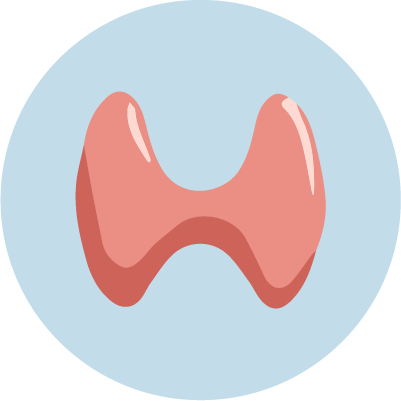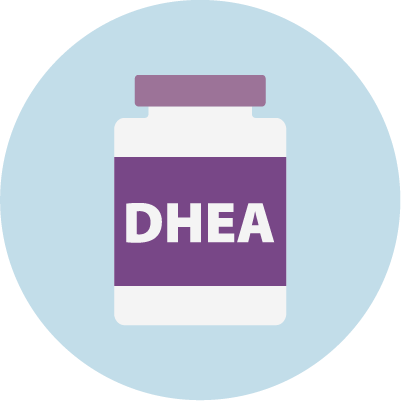
Sugar + Stress = A Hormonal Mess
Accumulating research shows that there are many environmental factors that contribute to autoimmune conditions. The Top 6 Autoimmune Triggers You Can Control series helps simplify the seemingly endless potential triggers into 6 major autoimmune trigger categories I call F.I.G.H.T.S.™ for:

Greatly affected by external factors, hormones like insulin, cortisol, sex hormones and vitamin D levels, actually have a profound influence on your risk for autoimmune conditions. 1Jara LJ, Medina G, Voorduin S, et al. The endocrine system and autoimmunity. In: Anaya JM, Shoenfeld Y, Rojas-Villarraga A, et al., editors. Autoimmunity: From Bench to Bedside [Internet]. Bogota (Colombia): El Rosario University Press; 2013 Jul 18. Chapter 12.Available from: https://www.ncbi.nlm.nih.gov/books/NBK459473/
To prevent or heal from an autoimmune disorder, you’ll need to identify your personal triggers so you can eliminate them, minimize your exposure, or, in the case of hormone, get them balanced.
If you missed a previous post, check out the other FIGHTS factors:
Food
Leaky Gut & Dysbiosis (imbalance of gut bacteria)
Toxins
Infections
Stress
Hormone Imbalances
Autoimmune Trigger: Hormone Imbalance
Hormones. You can’t see them, but you can certainly feel them when they’re out of whack. These tiny messengers of the body may be the most critical underpinnings of our health and wellbeing. Studies show that hormonal imbalance is directly correlated to the development and perpetuation of autoimmune conditions. The intersection of autoimmunity and hormones is a vast and complicated topic, so let’s simplify things by focusing on the two main root cause culprits in your control: sugar and stress.
Sugar and Stress Lead to Hormonal Imbalance: 2 Short Stories
Anna’s Hormone Story
Anna was a vivacious working mom of three when the worst happened. Her eighteen-month-old son died in a tragic accident. After her excruciating loss, Anna’s deep grief, lingering depression, and mounting stress showed up on her body and lab tests. She gained eighty pounds, lost her hair in clumps, and went into premature menopause and ovarian failure. Doctors offered her antidepressants, sleeping pills, and a painful prediction that she would never get pregnant again.
Anna refused to accept the doctors’ dictates, and instead sought her inner strength to prove them wrong. She herself was a triple board–certified MD after all! Anna’s research and quest for natural solutions led her to adapt a “green” version of the ketogenic diet, which meant limiting sugar and starchy carbs, and adding nourishing fats along with lots of green vegetables and moderate amounts of protein. Anna also discovered the power of oxytocin — the love and bonding hormone — and set out to cultivate it as much as possible by prioritizing hugs, connection, and laughter. By ramping up her oxytocin production and changing her diet, Anna’s insulin sensitivity improved, she lost those eighty pounds, ran a triathlon, and with great joy, conceived and gave birth to a healthy baby girl at age 41.
My Hormone Story
For decades, I wrestled with severe PMS, bad acne that followed me into adulthood, and MS symptoms that worsened with stress. A well-meaning OBGYN put me on the birth control pill at age 15 to help mitigate my raging PMS, and over the years, subsequent OBGYNs told me there was no harm in staying on the pill until menopause. None of these doctors ever educated me on the possible causes for my PMS or acne—let alone made any connection between my hormonal challenges and MS. I had no idea my Standard American Diet (SAD) of high sugar and excess carbs coupled with an always-on stress reaction could throw my hormones into a tailspin, or that my hormones might be contributing to my MS.
While I proactively addressed the stress best I could with various relaxation efforts, I didn’t learn of the harm that I was doing to my body by consuming gluten, sugar, and synthetic hormones until I was in my forties. When I embraced a Paleo-keto diet and ditched the pill, I not only eased my hormonal misery, I also stopped the expression of MS in my body.
Anna and I have very different stories, but the broad strokes are similar: sugar and stress wreak havoc on our hormones. Given enough time, hormonal imbalances often lead to, or worsen, any number of devastating conditions including insulin resistance, diabetes, obesity, autoimmune conditions, cancer, and Alzheimer’s disease.
Autoimmune Trigger: Hormone Imbalances
Hormones may be tiny, but these molecules are mighty. The chemical messengers of the endocrine system, hormones are released by various glands (the pituitary, thyroid, adrenals, etc.) to communicate to your cells, prompting numerous vital functions, like triggering the onset of puberty, regulating appetite and blood sugar, and repairing damaged tissues. With so much at stake, it’s no wonder that hormone imbalances have the potential to cause so much trouble.
When your hormones communicate correctly, referred to as “hormonal homeostasis,” you sleep well, your energy’s high, your optimal weight is easy to maintain, your immune system is strong, and you’re more likely to be in a good mood. That’s “hormonal harmony.” But too much or not enough of even one hormone can throw the whole thing off balance and leave you more susceptible to autoimmune conditions or other chronic illnesses. Think of it like a lock-and-key formation; the hormones are the keys that bind to receptors on or inside cells, unlocking critical processes within your body. If your glands don’t produce enough hormones (keys) or your receptors (locks) are too clogged with toxins, the gate to hormonal harmony and good health stays locked, and the misery begins.
Hormones and Autoimmunity
If you have decreased energy, brain fog, moodiness, or trouble managing your weight, you may be one of the millions of Americans in a state of hormonal imbalance. And if you’re a woman, you’re three times more like to develop an autoimmune disorder — although men can certainly experience hormonal imbalance too.
The eight hormones most implicated in the development and perpetuation of autoimmune conditions include the following:
- Estrogen — Actually a trio of hormones (estrone, estradiol, and estriol), estrogen is best known for its role in the female reproductive system. However, estrogen is actually produced by both women and men and helps to maintain the health of your heart, bones, brain and skin, while also contributing to mood, sleep, cortisol, and thyroid regulation.
- Progesterone — Like estrogen, progesterone is most commonly known for its role in the female reproductive system, where it is essential for conception and a healthy pregnancy. But for both women and men, progesterone regulates moods, build bones, and helps with sleep.
- Testosterone — Testosterone isn’t just a male hormone; females need some too. In addition to building tissues (think muscle, bone, heart), it also increases sex drive, decreases body fat, and enhances memory, motivation, and cognitive function.
- Thyroid — The thyroid gland is your master metabolic regulator, responsible for managing your breathing, body temperature, hair growth, heart rate, energy level, and weight. Every cell in your body has thyroid receptors, so if your thyroid is struggling, you will be, too.
- Cortisol — Referred to as the stress hormone, cortisol is what puts your body into fight-or-flight mode. When it’s functioning properly, it also has an anti-inflammatory and immune-suppressing effect.
- Insulin — Insulin’s role is to help your cells use glucose for metabolic energy, but too much too often can cause your cells to store fat, especially in your belly, which can lead to type 2 diabetes.
- Vitamin D — This “prohormone” is converted into its hormonally active form in the liver and kidneys. Vitamin D is found on nearly every cell in the body and is vital for insulin regulation, immune function, and inflammation reduction.
- DHEA (Dehydroepiandrosterone) — As the precursor hormone to both testosterone and estrogen, DHEA is fundamental for hormonal homeostasis, supporting cognitive function, immunity, and bone, skin, and heart health.
The Six Most Common Hormone Imbalances in Autoimmunity
If any one of the eight hormones above isn’t released or received as it should be, you have a hormonal imbalance. A single hormonal imbalance puts every other hormone at risk, potentially leading to any combination of the following imbalances, which are those most likely to contribute to autoimmune and other chronic disorders. Take special note of how high stress and diet-related choices (specifically excess sugar) greatly contribute to these imbalances.

High insulin
Excess sugar, a hallmark of the Standard American Diet (SAD), is the main factor contributing to high insulin. The pancreas produces insulin to tell your cells to take up sugar; the more sugar you consume, the more insulin is created. Eventually, your cells hit max capacity and stop responding to the insulin. Since your body has nothing to do with the excess sugar, it stores it as fat — say hello to your annoying and potentially dangerous spare tire.
Symptoms: fatigue (especially after eating), cravings for sweets, weight gain in the abdomen, weight loss resistance, frequent urination, aches and pains, and dark patches on the skin.

High cortisol
Stress does to cortisol what sugar does to insulin: a little bit is okay, but too much sends your body spiraling. Humans were made to deal with stress and even thrive from it in small doses—our primitive fight-or-flight instinct, courtesy of cortisol, can save us if we need to run from a burning building. But for many people, stress has become such a regular part of life that our bodies are producing way more cortisol than we need, leading to a catabolic state (i.e. the body begins to break down faster than it can build up.) Eventually, your cells will become resistant to cortisol and levels will flatline.
Symptoms: feeling tired but wired, anxiety, heart palpitations, trouble sleeping, salt and sugar cravings, dizziness upon standing, and low blood pressure.

Estrogen dominance
Defined as too much estrogen in relation to progesterone in women and too much estrogen to testosterone in men, estrogen dominance is more likely with age as both progesterone and testosterone naturally decline. But two modern-day factors are to blame for the sharp increase in estrogen dominance: 1. Chronic stress, which creates high cortisol levels leading to the depletion of progesterone, and 2. artificial estrogen in the environment, found in Bisphenol A (BPA), phthalates, and parabens, as well as birth control pills and Hormone Replacement Therapy. Even conventional cow dairy loaded with growth hormones and steroid hormones can introduce extra estrogen into our bodies.
Symptoms in women: menstruation with heavy bleeding and severe cramps, increased PMS symptoms, weight gain in hips and butt, ovarian cysts, endometriosis, fibroids, migraines, miscarriages, rosacea, insomnia, brain fog, anxiety or depression, decreased libido, and gallbladder issues.
Symptoms in men: fatigue, loss of muscle mass, urinary tract issues, reduced libido, erectile dysfunction, anxiety or depression, increased belly fat, and enlarged breasts.

Low thyroid
Hypothyroidism is one of the most common hormonal disorders, causing your body’s metabolic system to slow, leading to feeling sluggish, tired, and cold, and a number of bigger issues, including depression, infertility, autoimmune problems, and degenerative brain conditions. Up to 90% of people dealing with hypothyroidism actually have an autoimmune condition called Hashimoto’s thyroiditis, in which the immune system inadvertently attacks thyroid tissue.
Symptoms: weight gain or weight loss resistance, hair loss (including the outer third of your eyebrows), poor concentration, brain fog, constipation, tiredness upon waking, cold intolerance, depression or anxiety, joint aches and pains, and dry skin, hair, or nails.

Low vitamin D
Many factors can contribute to vitamin D deficiencies, including age (over 65); darker skin pigmentation; limited sun exposure either due to the use of sunscreen, little time spent outdoors, or winter season in the northern hemisphere; and in some cases, a genetic mutation in the D receptor site genes, called VDRs. In addition to its connection with autoimmune conditions, low vitamin D is linked to cardiovascular disease, cancer, and dementia.
Symptoms: fatigue, aches and pains, weakness, frequent infections, osteopenia, osteoporosis, bone pain, and bone fractures.

Low DHEA
DHEA naturally begins to decline in your twenties, but chronic stress also contributes to the loss of this foundational hormone. Adrenal glands are responsible for the production of both cortisol and DHEA. When stress is high, your adrenals work on over time to make cortisol. When they become depleted, DHEA also goes down, compromising the body’s immune system and accelerating the aging process. Low DHEA is associated with many chronic illnesses as well as cancer and heart disease.
Symptoms: profound fatigue, decreased stamina and alertness, aches, weakness, malaise or depression, reduced muscle mass and bone density, thin skin, low libido, frequent infections, dry skin and eyes, poor memory, and weight loss resistance.
Finding Hormonal Homeostasis
If you go to the doctor with any collection of these symptoms, you’ll undergo a few tests and end up with some prescription medications, but eventually, you’ll be told that whatever you have going on is just part of getting older. While it’s true that hormones decline with age, our modern lifestyle—daily high stress, a diet based on refined sugars and carbohydrates, and constant exposure to environmental toxins—only serves to speed up the process. The fact is that developing autoimmune disorders, diabetes, and other chronic illnesses is not normal, and hormonal imbalance is not inevitable.
Here’s how to get back to hormonal homeostasis:
- Determine What You’re Dealing With
This is really a two-phase step that first requires looking inward, and then, looking outward for help:

Which hormonal imbalance(s) resonates?
a. Review your symptoms and consider your root causes. If you’re already dealing with an autoimmune condition you likely have at least one imbalance if not more. Which hormonal imbalance(s) do you think you have? And why?
Once you have a sense of where you stand, it’s time to…

Get tested!
b. Get tested! The only way to know for sure which hormonal imbalances you have is to look beyond your symptoms and get the facts. I highly recommend working with a practitioner specifically skilled in hormone health. There are blood tests available to check insulin, thyroid, and vitamin D levels; a salivary test is an easy way to check your cortisol and DHEA production; and dried urine testing offers a new way to check your estrogen, progesterone, and testosterone levels. A practitioner can determine which tests to order and help you interpret your results, but if you must go it alone, find direct-to-consumer hormone testing through True Health Labs, mymedlab, Walk-In-Lab, Canary Club, DirectLabs, Ulta Wellness, LifeExtension, HealthCheckUSA, or Request a Test.
2. Address All The Other F.I.G.H.T.S.™ Factors
The fastest way to establish hormonal homeostasis is to address the other top autoimmune triggers: Food, Infections, Gut Health, Toxins, and Stress. For most people, when all other aspects of your health are in in tune, your hormones naturally fall in line.

Remove SAD Foods
Sugar and processed carbohydrates are linked with increased insulin. Non-organic produce and commercially raised meats, poultry, and dairy products can contribute to estrogen dominance.

Reduce alcohol and coffee
Alcohol is associated with estrogen dominance (and an increased chance of breast cancer), while coffee raises cortisol levels, increasing insulin and estrogen.

Eat organic vegetables
Leafy greens, cruciferous vegetables (think broccoli), and sulfur-rich onions and garlic support the liver to clear excess estrogen and metabolites.

Enjoy healthy fats
Fat is necessary for hormone production, cell membranes, and brain health. Ditch unhealthy fats (vegetable oils) in favor of saturated fats, like coconut oil and ghee. Eat more omega-3 fats (salmon, grass-fed animals, flax seed, and walnuts). Extra virgin olive oil, avocados, and other nuts and seeds are also good.

Increase your fiber
Fiber feeds your good gut bacteria, helping your thyroid and improving insulin sensitivity, and binds to toxins like estrogen to remove them from the body.

Heal your gut
Probiotics, from supplements and fermented foods, and prebiotics, from vegetables, flax and chia seeds, and supplemental powders, help keep your microbiome thriving. A healthy gut keeps the thyroid working, lowers cortisol levels, and even raises vitamin D levels.

Avoid toxicants
Do whatever you can to remove damaging chemicals from your environment, starting with your home and personal-care products. Replace plastic with glass when possible and filter your water.

Get better sleep
Your body craves eight hours of good sleep each night to balance your hormones (insulin, cortisol, and hunger hormones) and keep extra weight off your frame.

Move more!
Exercise is a great way to help your hormones synchronize.

Get outside
Time spent outside has been proven to lower stress levels. Morning sunlight can actually help to regulate your hormones and help you sleep better at night.

Pause
Even twenty minutes of rest a day can help put you in a healing state. Try meditation, yoga, dancing, listening to calming music, or a bath.
3. Try Herbs and Adaptogens
Sometimes lifestyle modifications aren’t enough to balance hormones. If you find you need extra support, like I did, these are supplements that are scientifically proven to help. Based on your lab results and symptoms, your practitioner can help you determine the best combination of supplements and proper dosage for you.
- To lower cortisol – Ashwagandha* or Rhodiola and Phosphatidylserine (PS) *Note: Ashwagandha is a nightshade so avoid if sensitive to the Solanaceae (nightshade) family; or if pregnant.
• To lower insulin – Berberine, chromium picolinate, Biotin (B7)
• To lower estrogen – DIM, calcium-d-glucarate (CDG), and vitamin C
• To optimize thyroid function – iodine, selenium, zinc
• To raise D levels – vitamin D3 with K2
• To raise DHEA – over the counter: oral micronized DHEA start with low 5 mg dose in the morning
When to Consider Bioidentical Hormones
Did you know bioidentical hormones are different from synthetic hormones? The latter, used in Hormone Replacement Therapy for post-menopausal women, have been correlated with breast cancer, heart disease, stroke, and pulmonary embolism. Derived from plant molecules, bioidentical hormones are identical to hormones produced in the human body. There is evidence that the use of bioidentical hormones in people with autoimmune conditions can help reduce inflammation and offer immune protection.
If you’ve tried addressing each of the other autoimmune triggers, implemented lifestyle changes, and introduced appropriate supplements with little or no changes, it may be time to consider bioidentical hormones. You’ll need to seek out the help of a practitioner well experienced in balancing hormones. She or he can guide you on the best options for your particular imbalances and health considerations.
Work with a hormone specialist:
I am fortunate to collaborate with a naturopath who is a women’s health expert and hormone specialist. Together we help women across the U.S. balance their hormones, beat autoimmune disorders, and have babies! We have helped women ease menopausal symptoms; we’ve helped improve people’s moods; and we’ve even helped clients get pregnant when they were struggling.
Hormones and autoimmunity can be a daunting topic, but I have learned more than I ever imagined and have condensed that knowledge and personal experience into a practical book called Beat Autoimmune, The 6 Keys to Reverse Your Condition and Reclaim Your Health. The Balance Your Hormones chapter could be a book unto itself!
Take good care!

P.S. Want my personal help? If you live the U.S. and are ready, willing, and able to invest in your best health, I offer Functional Medicine Total Health Transformation Programs over Zoom. I collaborate with skilled naturopathic doctors (NDs) who are expert in resolving root causes like hormonal imbalances, gut disorders, chronic infections and toxic burdens which are almost always part of the autoimmune puzzle. Together we provide comprehensive, customized treatment plans, and collaborative, caring support. If you are ready to beat autoimmune and reclaim your best life please book a 30–minute consultation with me to gain clarity, confidence, and explore the possibility of working together. You can do it. We can help.






